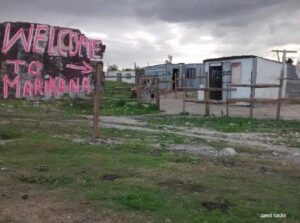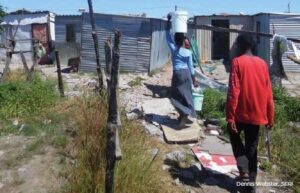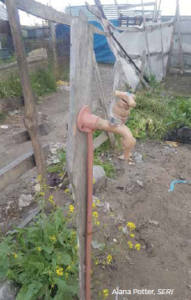Marikana, Cape Town: With a decolonized mindset, self-governance is possible.
By Yuhana Khan
Introduction
Marikana is an informal settlement in the Philippi East township of Cape Town, South Africa. By the year 2015, Marikana had over 60,000 residents and 12,000 households (Chamberlain et al., 2020, 7). The government’s delivery of services such as water, sanitation, electricity, and trash pickup are quite limited because informal settlements such as Marikana are not included in municipal service delivery budgets (Victor, 2019, 304), leading to serious public health problems. The community had only 100 taps for potable water, forcing an average of 600 people to share one tap (Chamberlain et al., 2020, 9). To make matters worse, occasionally water is shut off during weekends or periods of water shortage. However, residents have developed creative methods to work around this limited provision of water services, such as establishing their own water systems and channels. Some residents pay for community infrastructure to be installed, and then they connect to the main or abandoned water lines. The goal of these “DIY infrastructure projects” (Victor, 2019) is not only to provide water to the settlement. Residents also hope to develop sufficient infrastructure to be considered as “formal” in the eyes of the state, thus forcing the authorities to provide the settlement with water services (Victor, 2019, 305).
Analysis
What we see occurring in Marikana is a form of alternative-substitute place-making. This concept describes local solutions to the challenges faced every day in informal settlements. The goals of such projects are small scale, but these projects nevertheless incrementally change the quality of daily life. Alternative-substitute place-making constitutes people-based approaches to place-making whereby community members provide substitutes for services not offered by the government through formal planning processes (Andres et al., 2021, 34-35). That is to say, the state, through its planning and legal framework, has the power to decide when a settlement is “informal”, or not (Roy, 2005, 149). Informality is thus reproduced by the failure of authorities to provide services, illustrating that authorities have the power to regulate by providing or withholding essential services.
The state’s power to determine what is informal reflects the colonial hierarchy through which the label of “informality” serves to classify Marikana as inferior, even though it is a functioning community, which illustrates the danger of distinguishing informal versus formal through a Western lens (Kamete, 2013, 17). Sub-Saharan Africa has faced a great deal of colonial planning, and countries in the region still pursue Western style planning today in the hopes of modernizing its cities. According to Kamete (2013), the notion of modernity that drives planning in the region is derived from Western models, which in turn originate from colonial influences.
Traditional planning processes resulting from colonial models thus often fail to generate solutions to the challenges facing diverse, complex, and unequal urban environments. Participatory planning approaches may serve such communities better than traditional, technical approaches (Andres et al., 2021, 30), providing citizens better access to service delivery along with social and political recognition. However, the expansion of political rights through neoliberal inclusion does not always guarantee access to necessary resources such as water infrastructure (Miraftab, 2009, 40).
For Marikana, the formalization efforts achieved through DIY projects are their gateways to development (Victor, 2019). Residents have no alternative but to organize and fix the fragmented aspects of the community without governmental support. These DIY projects, ultimately, have the potential of providing communities with the recognition of authorities, which dangle the hopes of development in front of the residents. However, if formality requires modernization to Western standards, the formalization requirements will become unachievable and coloniality will continue to be reproduced through urban planning.
Implications
The case of Marikana suggests that self-governance has the potential to support a community with limited access to resources. The reason self-governing might work in this environment is that residents understand their own problems and obstacles (Kamete, 2013, 39). However, with support from the government it is more likely the problems could be addressed more quickly and comprehensively – or so we as planners are trained to believe: a colonial mindset can obscure our perception of relations of power in the community. It is therefore important for planners to understand what it means to occupy positions of power, the way these positions change over time, and how relationships formed with the community impact planners’ positionality and roles in supporting self-governance initiatives (Kohl and McCutcheon, 2015, 748).
As Nunbogu et al. (2018) suggest planners and government officials should seek to understand the self-governance structures and community initiatives that emerge from daily life in communities such as these. Residents in informal settlements understand the challenges facing their communities and are better positioned to address them (Nunbogu et al., 2018, 39). When planners and informal settlers learn from each other’s expertise, the likelihood therefore increases that development will take a form that is acceptable and feasible for residents. As Kohl and McCutcheon (2015) suggest, such learning can take the form of informal, “everyday talk” with residents, which can aid planners in understanding social relations and local knowledge that underpin self-governance initiatives. Such community engagement will better position planners to assist informal settlements in gaining access to the government, thus providing residents with a venue to seek support for their own DIY initiatives.

Welcome to Marikana – an informal settlement based in Cape Town, South Africa. Jared Sacks, SERI of South Africa.

Residents carrying their share of water back to their homes. Denise Webster, SERI of South Africa.

Alana Potter, SERI of South Africa. Water tap that serves 600 people.
